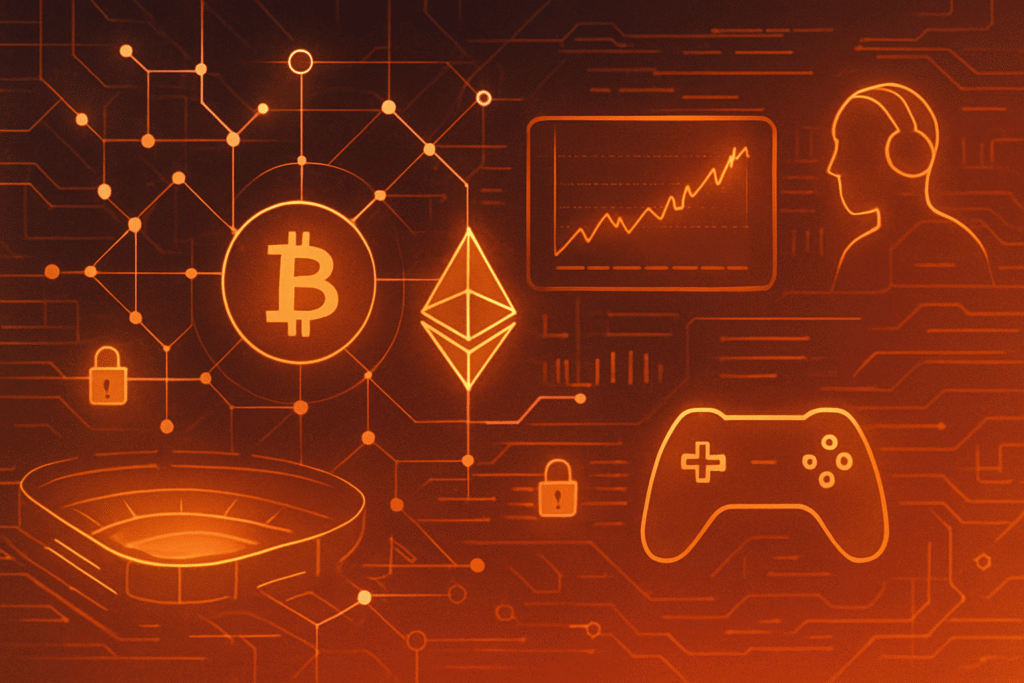
September 30, 2025 – The competitive gaming world is undergoing a profound transformation as cryptocurrency and blockchain technology increasingly integrate into its core. This ongoing evolution, accelerating through 2025, is redefining everything from player monetization and fan engagement to the fundamental infrastructure of esports transactions. The convergence is driven by the shared demographics of young, tech-savvy audiences and a mutual pursuit of digital innovation, blurring the lines between entertainment, finance, and community ownership.
While initial reactions from the broader gaming community were mixed, often marked by skepticism regarding volatility and scams, a growing understanding of blockchain's practical benefits is fostering more positive sentiment. This shift matters immensely for both ecosystems: for esports, it offers solutions to long-standing challenges like slow international payments and limited monetization; for crypto, it provides a massive, digitally native audience eager to embrace real-world applications of decentralized technology, cementing its utility beyond speculative trading.
Market Impact and Price Action
The financial implications of crypto's integration into esports are staggering, signaling a multi-billion dollar investment opportunity. The global blockchain gaming market, a key component of this synergy, is valued at an estimated $13.97 billion in 2025 and is projected to skyrocket to $259.48 billion by 2032, boasting an impressive compound annual growth rate (CAGR) of 51.8%. This expansion is fueled by novel crypto-economic models that fundamentally alter how value is created, owned, and exchanged within the gaming sphere.
Broader cryptocurrency market trends have provided a robust backdrop for this growth. Bitcoin (BTC) achieved a historic milestone in mid-2025, surpassing $100,000 and reaching an all-time high of $122,000, largely propelled by institutional demand from U.S. spot Bitcoin Exchange-Traded Funds (ETFs). Ethereum (ETH) has also garnered substantial interest, with analysts projecting it could test the $15,000 level by the end of 2025. The total cryptocurrency market capitalization reached approximately $4.2 trillion in 2025, indicating a strong underlying bullish sentiment, despite some quarterly fluctuations in trading volume.
Within this broader market, GameFi tokens and esports-related crypto assets have exhibited mixed but ultimately growing trends. While the total market cap of major GameFi projects saw some decline in late 2024, the sector as a whole recorded a 9.51% increase in market capitalization that year, reaching $23.646 billion, before settling around $15.4 billion. Projects like Echelon Prime (+31.86%), GALA (+6.06%), Notcoin (+8.53%), and Wilder World (+96.81%) have demonstrated resilience and significant growth. Infrastructure plays like Immutable (IMX), a Layer-2 scaling solution for NFTs and gaming on Ethereum, and Ronin, known for its strong network effect in gaming ecosystems, are pivotal to this growth, facilitating faster, cheaper, and more scalable transactions. Predictions for specialized tokens such as Esport (ESPT) suggest potential rises of over 228% by June 2025.
The gaming NFT market is another rapidly expanding segment, valued at $6.14 billion in 2025 and projected to reach $83.26 billion by 2035. In-game assets represent the largest share, estimated at 42% in 2025, with quarterly NFT sales within blockchain gaming reaching $2.32 billion in 2025. This robust activity highlights the increasing value and liquidity flowing into digital ownership within esports. Overall, global crypto trading volume consistently exceeds $2.8 trillion per month, with the first half of 2025 seeing exchange trading volume surge to $9.36 trillion. Investor sentiment, while largely bullish due to institutional adoption, remains cautiously optimistic, reflecting a maturing market that balances innovation with a keen awareness of macroeconomic factors. This cycle mirrors past tech innovation adoptions in crypto, moving from initial hype and correction towards utility-driven growth and institutional acceptance.
Community and Ecosystem Response
The integration of crypto in esports has sparked a dynamic and often polarized response across various communities and platforms. On traditional gaming subreddits like r/leagueoflegends and r/eSports, skepticism often prevails. Many gamers voice concerns over the perceived lack of genuine use cases for blockchain, the prevalence of "pump and dump" schemes, and the environmental impact of certain cryptocurrencies. There's a strong sentiment against what's viewed as another form of aggressive monetization, with NFTs sometimes seen as worse than traditional microtransactions.
However, on platforms like Twitter (X) and within dedicated Web3 gaming communities on Telegram, the sentiment is more enthusiastic. Crypto influencers actively promote the benefits of true digital ownership, new fundraising avenues for teams, transparent tournament payouts, and enhanced fan loyalty through verifiable digital memorabilia. Esports personalities and organizations have also shown varied reactions. Joseph Turner, co-founder of Gaimin Gladiators, expresses a belief that Web3 games will become the norm, offering solutions to transparency and profit distribution. Many organizations are leveraging NFTs for exclusive experiences and digital collectibles, and some players are accepting portions of their salaries in cryptocurrencies. Yet, caution persists due to past incidents involving questionable crypto promotions, leading to increased scrutiny and calls for greater due diligence from industry figures like Ryan Wyatt, CEO of Polygon Studios (who acknowledges the strong anti-NFT sentiment among many gamers).
The impact on related DeFi protocols, NFT projects, and Web3 applications is significant. While direct integration with core DeFi protocols like lending is less common, the underlying principles of decentralized finance – fast, low-cost, and transparent transactions – are fundamental. Stablecoins facilitate quick international prize payouts, and decentralized betting platforms offer greater transparency in esports wagering. NFTs have found strong use cases in digital collectibles, memorabilia, and true in-game asset ownership, creating real-world value for virtual possessions. Web3 applications are driving new forms of engagement through decentralized tournament platforms, fan tokens that allow voting rights and rewards, and even crypto-powered esports scholarships that offer faster, more transparent payouts globally.
Key community discussions revolve around the balance between blockchain's promise of transparency and the lingering skepticism due to past scams. The evolution from "play-to-earn" (P2E) to "play-and-earn" (P&E), prioritizing engaging gameplay over pure speculation, is a critical shift aimed at overcoming skepticism. Accessibility and user onboarding remain significant barriers, with efforts focused on simplifying wallet integration and user experiences. Environmental concerns and increasing regulatory scrutiny, particularly around betting platforms and investor protection, are also central to ongoing debates, pushing the industry towards more sustainable practices and clearer legal frameworks.
What's Next for Crypto
As of September 2025, the future of cryptocurrency and blockchain integration in esports appears overwhelmingly positive and transformative, poised for deeper integration and mainstream acceptance.
In the short term (remainder of 2025), we can anticipate a surge in true digital ownership via NFTs, allowing players to genuinely own and trade in-game assets. The industry will firmly establish "play-and-earn" models, where engaging gameplay is paramount, and earnings serve as secondary rewards. Mobile blockchain gaming is set for significant growth, especially in emerging markets, supported by improved mobile wallets and streamlined onboarding. Fan engagement will be revolutionized through the continued rise of fan tokens, granting exclusive access and voting rights, and the increasing prominence of Decentralized Autonomous Organizations (DAOs) for player governance. Crypto esports betting is also projected for substantial growth, with global crypto gambling volume already soaring and esports accounting for 41% of total activity. Critical to this short-term outlook are improved onboarding experiences and continued institutional investment and strategic partnerships, such as the multi-year deal between Coinbase (NASDAQ: COIN) and Riot Games as the exclusive blockchain and cryptocurrency partner for League of Legends and VALORANT esports events.
Long-term, beyond 2025, blockchain gaming is expected to become an indispensable part of the gaming industry, blurring the lines between gaming, investment, and wealth creation. We will see advanced interoperability, allowing players to carry achievements, skills, and reputations across diverse platforms and game IPs. AI is set to play a crucial role in managing in-game economies, ensuring fairness, and creating adaptive opponents and dynamic storylines. The vision of decentralized esports, with shared fan ownership and governance, will grow, fostering inclusivity. Furthermore, real-world integration and "gamified DeFi" will expand, allowing gamers to earn and directly utilize tokens within DeFi protocols like staking and lending.
Several potential catalysts will drive this future. New technologies, including more efficient Layer 2 scaling solutions and the convergence of AI with blockchain, will enhance gameplay, security, and economic stability. Simplified NFT APIs, like those offered by OrdinalX, will accelerate developer adoption. Regulatory shifts are also crucial, with regions like the UK, US, Germany, and South Korea moving towards clearer, crypto-friendly licenses and robust AML/KYC protocols, fostering innovation within a structured environment. Major partnerships between Web2 and Web3 ecosystems, exemplified by initiatives like the Esports World Cup building strong partner networks, will continue to inject capital and expertise. Strategic considerations for projects include prioritizing engaging gameplay, simplifying user onboarding, designing sustainable tokenomics, ensuring compliance, and leveraging AI. Investors should conduct due diligence on tokenomics and compliance, favor "play-and-earn" models, consider infrastructure projects, and diversify their portfolios.
Possible scenarios for this convergence range from a Mainstream Dominance (likely) where crypto becomes an integral, almost invisible part of esports, to a Niche but Thriving (moderate) presence in specific genres, or a Regulatory Stifling (less likely) due to fragmented global rules. An Accelerated Scenario could also occur with a major technological breakthrough in scalability or user experience.
Bottom Line
The integration of cryptocurrency and blockchain into the esports landscape is not merely a trend but a fundamental paradigm shift. For crypto investors and enthusiasts, the key takeaway is the validation of blockchain's real-world utility in a high-growth, digitally native industry. The long-term significance lies in the creation of more transparent, equitable, and economically empowering ecosystems for players, teams, and fans alike.
As of September 2025, we are witnessing a maturation of the space, moving past speculative hype towards sustainable models like "play-and-earn" and genuine digital ownership through NFTs. This convergence promises to redefine player-game and fan-team relationships, fostering deeper engagement and new revenue streams. Important metrics to monitor include the growth of the blockchain gaming market cap, trading volumes of GameFi and esports-related tokens, the adoption rates of fan tokens, and the progress in regulatory clarity across major jurisdictions. The continued influx of institutional investment and strategic partnerships will also be crucial indicators of sustained growth and mainstream acceptance. The future of esports is undeniably intertwined with the decentralized revolution, promising an exciting and dynamic evolution for both industries.
This article is for informational purposes only and does not constitute financial or investment advice. Cryptocurrency investments carry significant risk.





